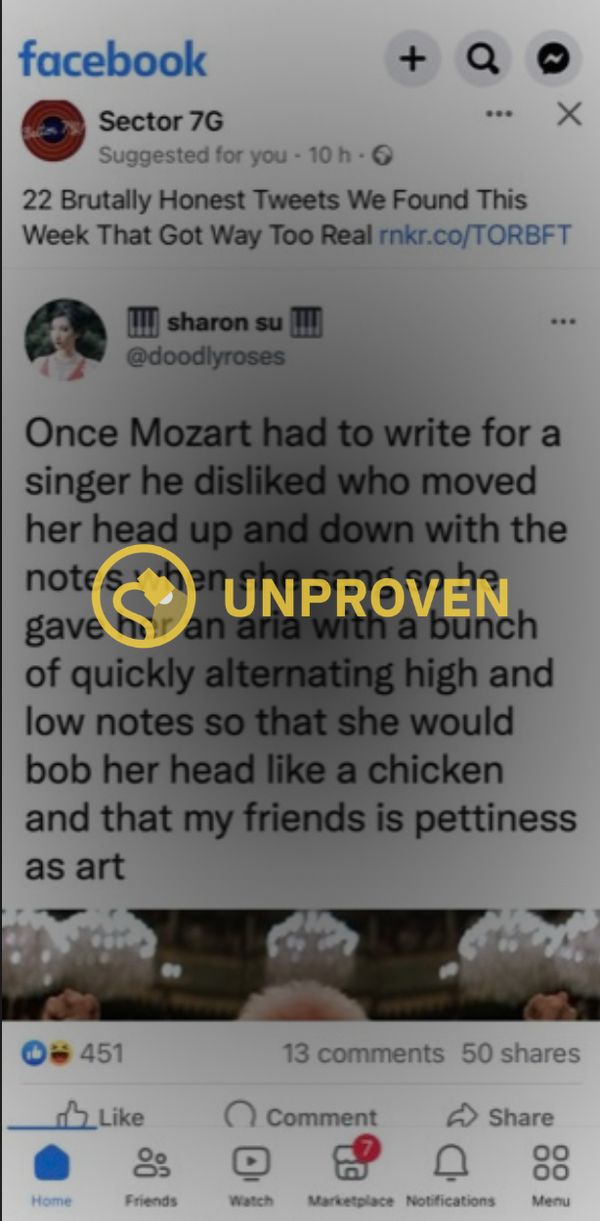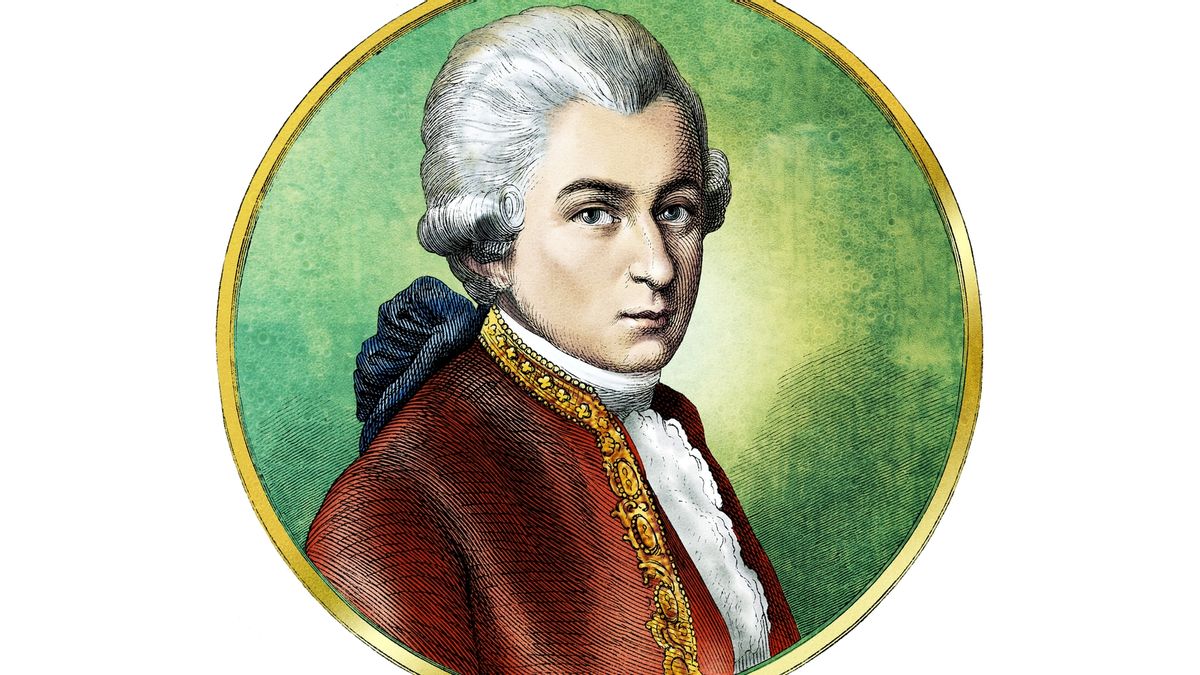An amusing question about Wolfgang Amadeus Mozart crossed our transom in early 2023, prompted by a viral anecdote claiming that the renowned 18th-century composer purposely wrote an aria in such a way as to embarrass a singer he didn't like. "Wondering if Mozart was really writing music to make singer look like a chicken," a reader asked.
It's a question that only makes sense in the context of the following anecdote, which has been passed around on every social media platform from Facebook to Reddit for years, albeit rarely with a cited source:

Once Mozart had to write for a singer he disliked who moved her head up and down with the notes when she sang so he gave her an aria with a bunch of quickly alternating high and low notes so that she would bob her head like a chicken and that my friends is pettiness as art.
We found variants of the same story repeated on the websites of professional opera companies, which gave it the appearance of credibility. This version, for example, which includes a few more specifics but again cites no sources, was posted in 2017 by Opera Omaha under the headline "Did You Know ... Così Fan Tutte Edition":
Apparently Mozart had an extreme dislike for the soprano Adriana Ferrarese del Bene, for whom the role of Fiordiligi was first created. She had a strange tendency to drop her chin and throw back her head while singing low and high notes respectively, and knowing this, Mozart chose to fill her showpiece aria ("Come scoglio") with constant harmonic leaps. Presumably he took great pleasure in watching her bob her head "like a chicken".
Our efforts to confirm the story by looking it up in more scholarly sources were unsuccessful, nudging us toward the conclusion that it is an oft-retold, but likely apocryphal, tidbit of operatic folklore. That said, certain basic details of the story are historically accurate. For example, the role of Fiordiligi in Mozart's 1790 comic opera "Cosi Fan Tutte" was indeed written for a well-known diva of the time, Adriana Ferrarese del Bene.
Ferrarese (or "Ferraresi," as her name was sometimes spelled) was known for her vocal range and dramatic flair, which scholars say is why Mozart chose her to debut a role intended, at least in part, to parody the conventions of opera seria ("serious" opera). It is true, judging from his own comments about her, that Mozart wasn't overly impressed with her talents in general. As musicologist Daniel Heartz noted in his 2009 book "Mozart, Haydn and Early Beethoven, 1781-1802":
Mozart did not think highly of Ferrarese's singing or acting. After he attended the opera at Dresden, he wrote his wife about the prima donna Maddalena Allegranti, "she is much better than the Ferrarese, but of course that is not saying very much" (letter of 16 April 1789).
But music scholars agree that Ferrarese's style was well-suited to the purposes of the composer and his librettist, Lorenzo Da Ponte, who wrote an aria, "Come scoglio," in which Ferrarese's character, Fiordiligi, vows that she and her sister will forever remain faithful to their fiancés. Heartz explained:
To make the point, Da Ponte summoned an old standby of opera seria, the metaphor aria, "Come scoglio immoto resta" (As the cliff remains unmoved by winds and storm, this soul remains strong in faith and love). Mozart responded with a parody of heroic soprano arias, including multiple leaps between high and low, from low A below middle C to high B-flat. ... For the last refrain, Mozart switches to Piu Allegro. Here Ferrarese/Fiordiligi got to show off her coloratura in rapid triplets, and her sustained tones.
It's important to take note of two things Heartz did not say: He did not say Mozart harbored an "extreme dislike" for Ferrarese (contrary to some versions of the anecdote), and although Mozart's clear intention in "Cosi Fan Tutte" was to parody the conventions of opera seria, Heartz did not say or suggest that Mozart intended to lampoon Ferrarese's physical mannerisms.
Another music historian, Bruce Alan Brown, claimed in his book "W.A. Mozart: Cosi Fan Tutte" (1995) that Mozart's parodistic intent did extend to making fun of the singer herself, but in reference to her vocal range, not her movements:
Fiordiligi takes the lead in repulsing the intruders, warning them not to profane their hearts, their ears, their affections; she and her sister will be faithful to their fiancés unto death. But Mozart undermines her utterances by expanding her vocal leaps to the point of parody — of Ferrarese herself (who was known for her wide range), and of a recent opera by Salieri in which she had displayed this gift.
According to Brown, Mozart parodied Ferrarese by giving her exaggerated vocal leaps "in inappropriate situations":
The qualities that suited Ferrarese to the prime roles in the Viennese repertory — her agility in passage-work and powerful lower register — left her prone to mockery, as when Mozart gives her a burst of coloratura in a thick ensemble texture (No. 13, Finale I), or exaggerated leaps between registers in inappropriate situations (before and during "Come scoglio").
Neither Brown nor Heartz mentioned anything about Ferrarese "bobbing her head" during performances, or Mozart targeting that idiosyncrasy for mockery.
Turning to another author, Dan Marek, himself an accomplished professional tenor and vocal instructor, we found that a version of that anecdote did appear in his 2016 book "Alto: The Voice of Bel Canto," framed as a quote from the late British music critic William Mann.
William Mann has an opinion about Mozart's sense of humor regarding these vocal gymnastics:
It was evidently recognized that these monster leaps were a special effect, to be reproduced even when the singer was not Adriana Ferrarese, who prided herself on her extensive vocal compass. Mozart did not care for her and, being required to display this specialty of hers, made her expose her gear-change from head-to-chest register, and back, as violently as possible. It was also said that Mozart was playing on Ferrarese's technique of ducking her head for low notes and throwing it back for her top register, so that in these bars she would look as well as sound undignified.
Note, however, that Marek prefaced the passage by calling it Mann's "opinion," and Mann prefaced the "head-ducking" anecdote with the words, "It was also said that ..." That is, Marek cited Mann, and Mann cited no source in particular, repeating the anecdote as if it were a piece of unverified gossip.
Our research, which of necessity was not exhaustive, did not get us any closer than this to a definitive source for the claim — which is not to say we can conclude the story is false, but all things considered and until further evidence demonstrates otherwise, we are rating it "Unproven."

